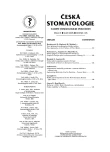-
Medical journals
- Career
New Approaches to the Problem of Third Molar
Authors: E. Rozkovcová; M. Marková; L. Mrklas
Authors‘ workplace: Všeobecná fakultní nemocnice, Praha ředitel MUDr. P. Horák, CSc., MBA ; Výzkumný ústav stomatologický 1. LF UK a VFN, Praha přednosta prof. MUDr. J. Dušková, DrSc. ; Stomatologická klinika 1. LF UK a VFN, Praha přednosta prof. MUDr. J. Mazánek, DrSc.
Published in: Česká stomatologie / Praktické zubní lékařství, ročník 105, 2005, 5, s. 119-128
Overview
The authors review most important characteristics in the development of the third molar. They include the time of foundation, course and the duration of individual stages of development, dynamism in the development of the third molar if upper and lower jaw, the occurrence of agenesis and its microsymptoms and the relation of the development of third molar to the dental and chronological age.
The analysis of panoramic radiograms from 1700 probands at the age of 5 and 21 years provided a general view of the development of the third molar from its foundation to the end of the root development. This picture may be considered as specific for the Czech population. The obtained values represent decisive indices for individual evaluation. The span of foundation of the third molar is 8 years (from 6 to 13 years of age). The foundation occurred most frequently at the age of 9 years. The last term was established at 13 years of age. These results are valid for the population, which is not burdened by the hypodontia syndrome.
Based on the calculation of the duration of individual developmental stages it has become possible to establish the mean period of development of the third molar. We have also determined differences in the course of development of third molars between the upper and lower jaw.
Intra-individual differences in the development of the third molar were encountered in about 50 % of our group. This rarely observed phenomenon is of considerable importance for the determination of dental age as well as the symptom of the hypodontia syndrome.
A significant relationship was observed between the degree of development of third molars and dental age. The important knowledge also includes the observed fact that the agenesis of 1–3 molar is accompanied by significantly delayed development of founded third molars.
All partial results were evaluated separately for boys and girls. No significant sex-related differences were established in other indices except the agenesis of third molars.
The time differences in key events in the development of the third molar should give more precision and certainty to planning of orthodontic therapy and should provide indices for optimal planning of extractions of third molars with unfavorable prognosis.
The described knowledge will contribute to the practice of anthropology and forensic medicine in the determination of age of adolescent individuals, if there is no other available biological method for the evaluation of chronological age.Key words:
third molar – characteristics in the third molar development – third molar and chronological age
Labels
Maxillofacial surgery Orthodontics Dental medicine
Article was published inCzech Dental Journal

2005 Issue 5-
All articles in this issue
- Diagnostic Possibilities in Impacted Teeth with Horizontal Position Near to Middle Palate Suture
- Attachment of Composites to Hard Dental Tissues and Morphological Comparison of Effects of Two Adhesive Techniques
- Computing Control of the Shape of Dental Arch in Patients with Cleft Palate
- New Approaches to the Problem of Third Molar
- Gingival Changes after Immunosuppressive Therapy II.
- Oral Health of Seniors in European Countries
- Augmenting Materials Used in Dentistry – Present State
- Czech Dental Journal
- Journal archive
- Current issue
- Online only
- About the journal
Most read in this issue- Diagnostic Possibilities in Impacted Teeth with Horizontal Position Near to Middle Palate Suture
- New Approaches to the Problem of Third Molar
- Augmenting Materials Used in Dentistry – Present State
- Gingival Changes after Immunosuppressive Therapy II.
Login#ADS_BOTTOM_SCRIPTS#Forgotten passwordEnter the email address that you registered with. We will send you instructions on how to set a new password.
- Career

